The big question… what do you bring with you on a journey lasting nine months, over four continents, through a myriad of temperatures and activities? Well, I hate to be super Swiss, but we are not as minimalist as I would like… and we brought a lot of stuff that many people leave home for a world trip. Why? Mainly, the answer is camping and diving.
We knew we wanted to trek and camp extensively in Argentina, Chile, and New Zealand, and aside from a few upgrades we decided to make, we owned all our gear. Many RTW pack lists or travel lists compiled by digital nomads say that you only need trainers, or trail runners at best, but if you try hiking in Patagonia without real boots, you’re an idiot. That’s as smart as driving a car in the Domnican Republic without a seat belt and hoping if you crash that your injuries won’t be too bad. If you plan on serious hiking, bring boots.
For diving, this was more of a question, shall we or shall we not buy gear? We plan on diving a lot this year, in the Philippines, Maldives, Indonesia, Thailand, Mauritius, Seychelles, etc… Sure, we could rent our gear each time relatively hassle-free, but that adds up in cost, plus you deal with relearning how the gear operates, rental gear is often broken or poor quality, and considering my bout with pneumonia last year, I thought it would be more prudent for me to use my own regulator if we would be spending a lot of time under water, so we decided to buy BCDs, regulators and octopuses, diving gauges, a wetsuit for me, and dive knives.
So, onto the list!
Clothing:
- Zip off hiking pants (double as shorts)
- Puma black workout pants (double as “casual smart” pants)
- thermal tights (layer under pants or dresses in cold weather, layer under both pants at once for maximum warmth)
- Travel skirt with pockets
- 1 Icebreaker dress
- running shorts
- Heart rate monitor
- 2 athletic tanks with built-in bras
- 1 t-shirt
- 3/4 sleeve quick-dry travel shirt
- Thin nightgown (doubles as a shirt on laundry days)
- Icebreaker cardigan
- rash guard (doubles as a long sleeve shirt in cold weather)
- 7 undies
- 3 hiking socks
- 3 running socks
- dry towel (1 big, one small)
- sarong wrap
- 1 bra
- 1 sports bra
- 2X bikini (Actually brought three because I got some Nallas, which are super thin and dry fast. Couldn’t help it…)
- Hiking Shoes
- Running shoes
- Teva sandals
- Cheap target flats that are easy to fold up
- Gortex rain jacket
- Down jacket
- Waterproof pants
- Big red travel scarf (my must for sleeping on planes!)
- Buff
- Waterproof gloves (I was devastated to lose one of these brand new, expensive gloves, less than a week into our Patagonian time…)
- Hat (ended up bringing my running cap)
- Sun visor
(What could I have cut out? If both my athletic tanks were supportive to run in, or if I had one athletic bra instead of a normal one as well, I could have cut out an extra bra. Technically the nightgown was not mandatory, but if you are sleeping in hostels, sometimes purposeful nightwear is helpful, especially if your only T-shirt is all sweaty. Could have cut out the third swimsuit, even if it is so small and light, or the second swimsuit as well. And I could have skipped my pair of flat shoes, which I stuck in at the end and have only worn once in Brazil so far.
Also, once we landed in NZ, I was a bad girl at the Icebreaker store and bought a second Icebreaker cardigan and another Icebreaker dress because they are styles I love, and a thin Icebreaker T-shirt to hike in because mine is mostly cotton and dries way too slow, but the tank tops chaff my shoulders raw in the pack after several hours hiking.)
Kay Clothes:
- 2 Hiking pants zip-off
- Chino pants
- Icebreaker thermal tights
- running shorts
- HRM
- 1 running t-shirt
- 1 thin travel cotton t-shirt
- 1 icebreaker t-shirt light
- 1 icebreaker t-shirt heavy
- 1 long sleeve travel shirt
- 1 thermal turtleneck
- rash guard
- 6-10 undies
- 4 hiking socks
- 2 normal socks
- Swim trunks compact and normal size (one he uses for hiking trips and under wetsuits, the other is more manly or something)
- board shorts (double as normal shorts)
- Hiking Shoes
- Barefoot running shoes
- Havaianas
- Tevas
- Casual dress shoes
- Gortex rain jacket
- Down jacket
- Windstopper jacket (doubles as a pullover for him)
- Gortex pants
- Arafat Scarf
- Buff
- Waterproof gloves (windstopper + gortex)
- Fingerless gloves
- Jungle hat
- 1 baseball cap
- Ear muff band
- Warm hat thick
(Oh man, Kay was hard to make pack light. Really struggled. He wanted to take like all the T-shirts on Earth, and he refused to leave his Havaianas at home and take just the Tevas for our river crossings, plus his barefoot shoes cannot double as city shoes so well, so he needed to take some normal shoes, which of course are a million times bigger and heavier than my pair of fold up flats. And his gloves were two separate pairs, one for wind/warmth and one for water, plus his fingerless gloves too… Oi.)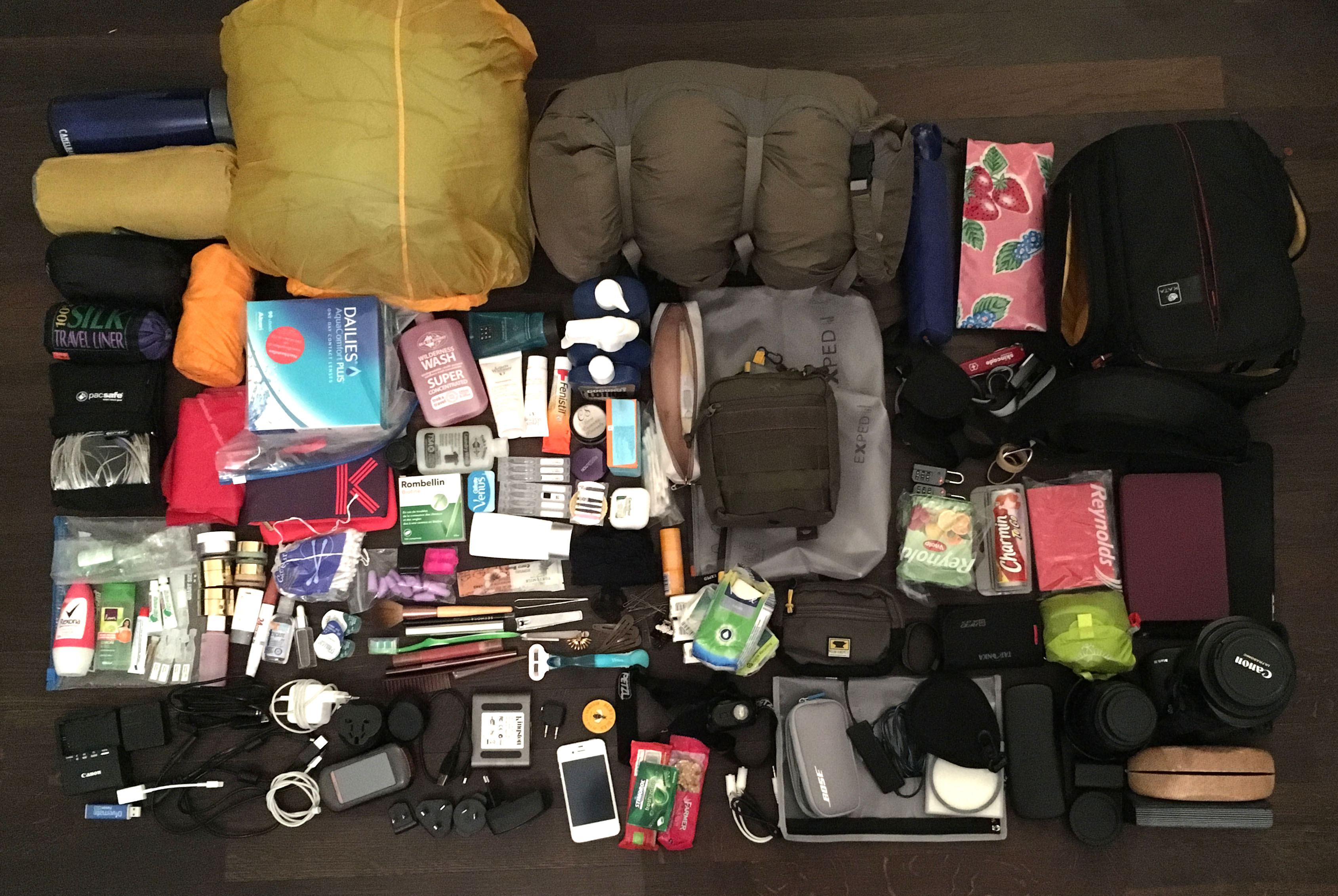
Toiletries:
- Nail clippers
- Tweezers
- insect repellent
- Contacts
- Laundry washing bags
- Laundry soap
- Hair ties, headband
- Comb
- Floss
- Toothpaste
- Toothbrush
- Aloe
- Sun tan lotion
- Eye cream
- Face cream
- Lotion
- Shampoo
- Body wash
- Face wash
- Deodorant
- Makeup (small pot of foundation, brow pen, mascara, eye liner, lip stain, lipstick)
- Extra earplugs
Carry on:
- Canon 5DIII plus two lenses, extra battery, filters, memory cards, and chargeriPad + charger
- Card reader
- iPad x2
- Phone + charger x2
- Kindle x2
- Passports
- Tissues
- Earplugs, lip balm, hand lotion
- Wallet
- Money belt x2
- International plug adapters x2
- Sunglasses, prescription and non-prescription
- Glasses case and 1 set extra glasses
- Bose headphones x2
- Biotin tablets
- Snacks
- Gum, Ricola
- Sleeping masks
- Hand sanitizer
-
Microsoft Surface
-
Olympus Camera
- Thermaband physical therapy band
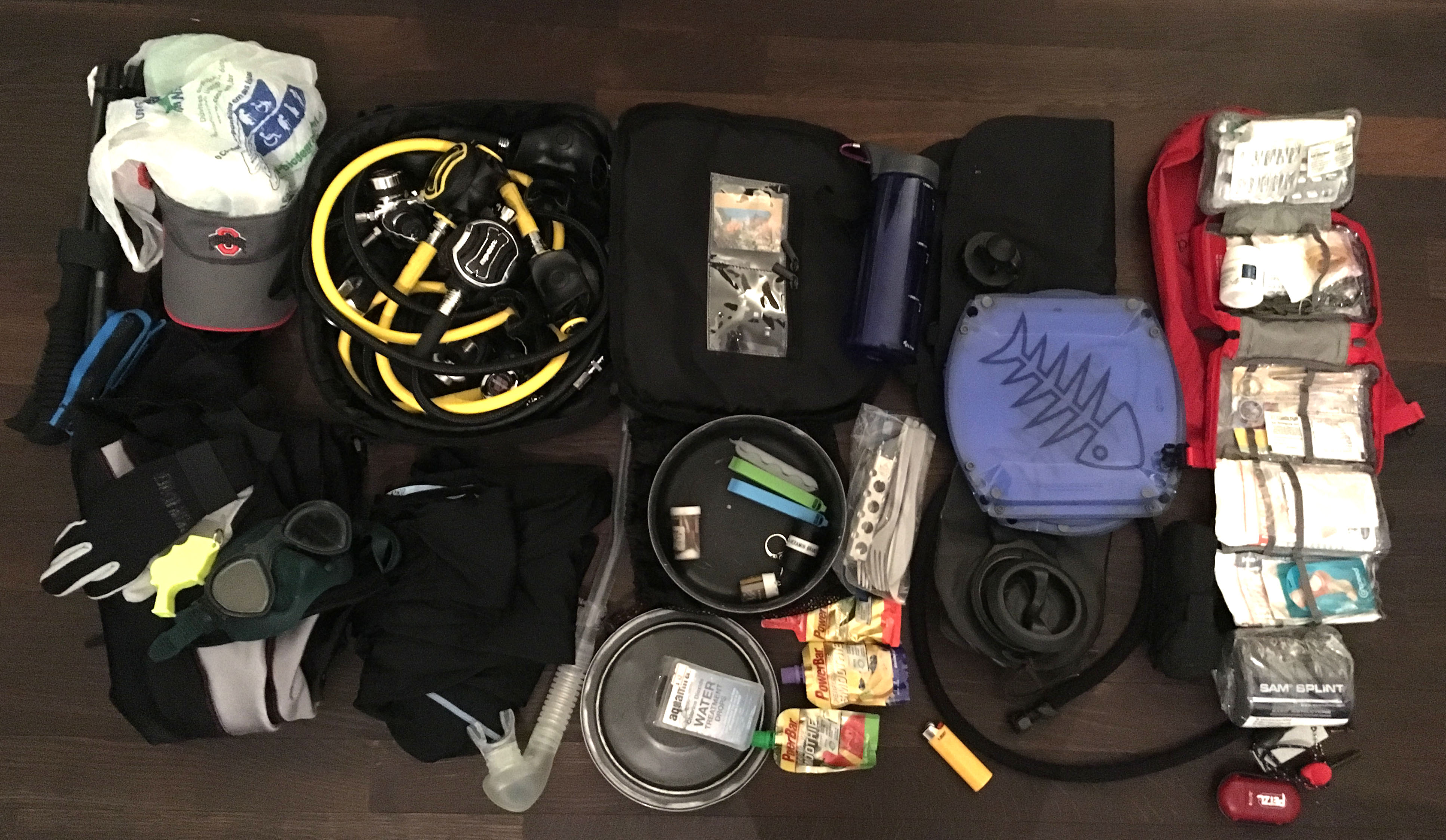 Camping Gear:
Camping Gear:
- Sleeping bag x2
- Silk sack x2
- Mammut blowup Pillow
- Mat x2 (We upgraded our old ones to these new, thicker Exped ones. Best decision ever.)
- Schnozzel bag to blow up the new mattresses, doubles as a waterproof bag for my sleeping bag
- Plastic utensils
- Folding snap-up plates, bowls, and cups
- Headlamps
- 1 neck lamp for Kay
- Swiss Army knife x2
- Water bottle x2
- Camelbaks x2
- Hiking Sticks (We also upgraded and bought new, extremely light and collapsible ones)
- Rain cover for my pack, doubles as an airport transport bag
- Dry bags a plenty
- Tent
- Outdoor GPS
- MSR Cooker + repair set
- Fuel bottle
- Fire Starter
- Magnesium Block
- Water Filter
- Aquamira
- Water transport bag
- Cooking pans
- Jetboil (we bought this in NZ after a lot of debate, it made some of the hikes a lot easier)
- Lighter x2
- Dextrose sugar tablets
- Some dry bag food we had at home
- Some running gels lying around at home, which we would have had to throw out for the movers otherwise.
Medical kit: Also for camping
- First aid kit
- Mirror
- Whistle
- Chem Lights
- Tourniquet
- Sam Splint
- Paracord
- Zip lock bags
- Duct tape
- Rubberbands
- Locks
- Sewing kit
- Coal Tabletts
- Immodium
- Malarone (anti malarial tablets, as we are going to some heavy malaria zones)
- Ibuprofen/aspirin
- Thermometer
- Alkaline Soap
- Fenistil (itch relief for bug bites)
- Compeed (blister patches)
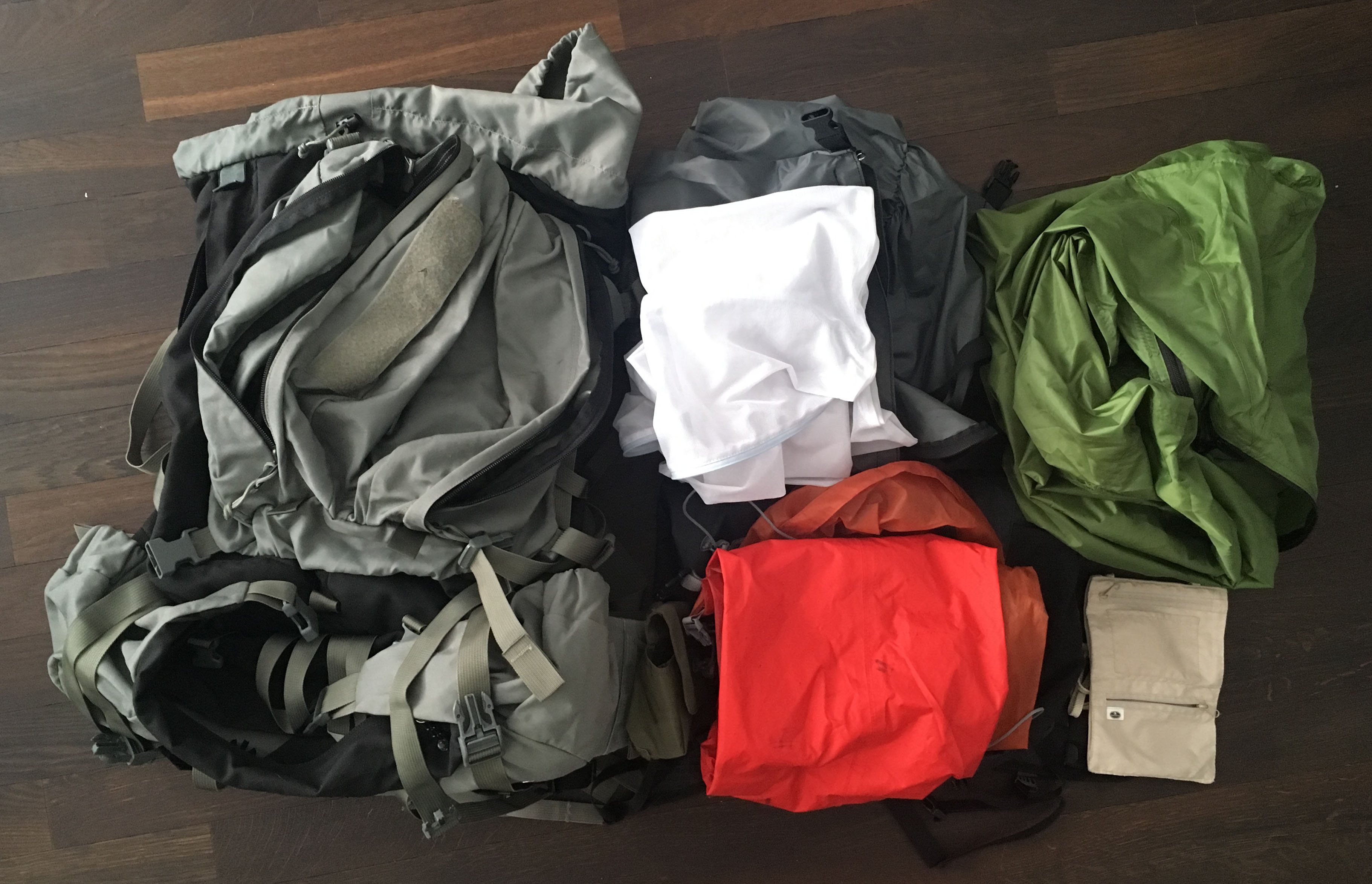 Baggage:
Baggage:
- Mystery Ranch trekking backpacks x2 (My checked bag and Kay’s carryon and personal item)
- Ortlieb watertight bag (Kay’s checked bag)
- Exped watertight backpack (My carryon)
- Camera bag (My personal item)
- Pack-able day pack from Osprey
- Pacsafes x2
- 1 extra big light duffle bag as a temporary stash bag between hikes
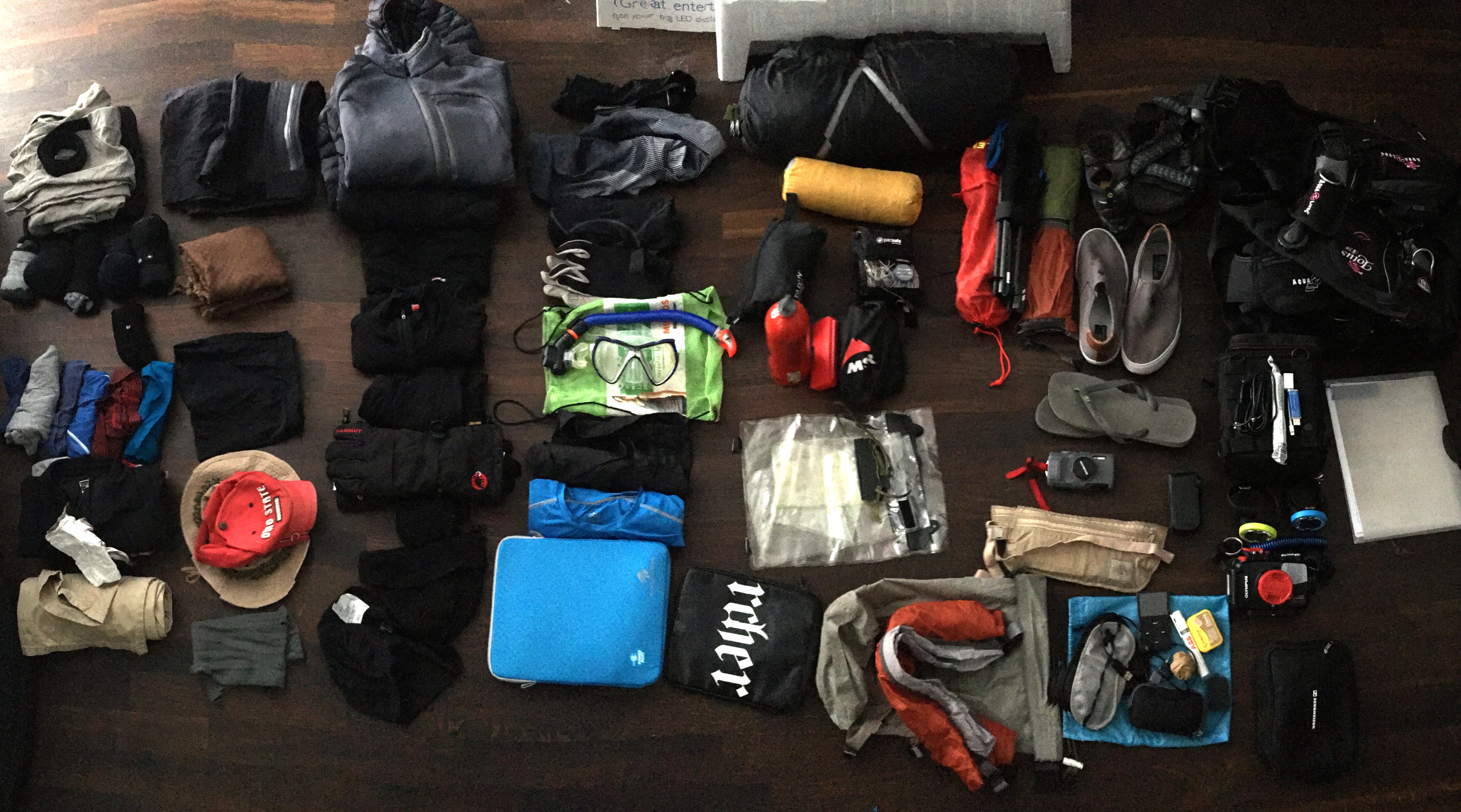 Diving:
Diving:
- Mask x2
- Snorkel x2
- Gloves x2
- Padi licenses x2
- Dive computer x2
- Dive computer connectors
- BCDs x2
- Sharkskin wetsuit
- Dive case for Olympus
So, that’s it. If you aren’t going to be doing serious trekking like we planned, and you don’t dive, or will be diving minimally and happy to rent here or there, that would already cut a ton of things off your list. Even for the medical kit alone, we only brought half the stuff in there because we knew we would be in places with no phone signal, no road access, and very few thru hikers who would be able to help us in case something happened. And since writing this, we have used most of the hiking gear including the often undervalued medical kit, with both of us having cut open blisters, used compeed, taken my temperature, used pills, ointments, etc. Thankfully we did not need the tourniquet yet. 😉
If you are planning an “easy” city-style RTW trip mostly staying in hostels or hotels and not camping God knows where next to some freezing weather, this list is probably not for you. 🙂

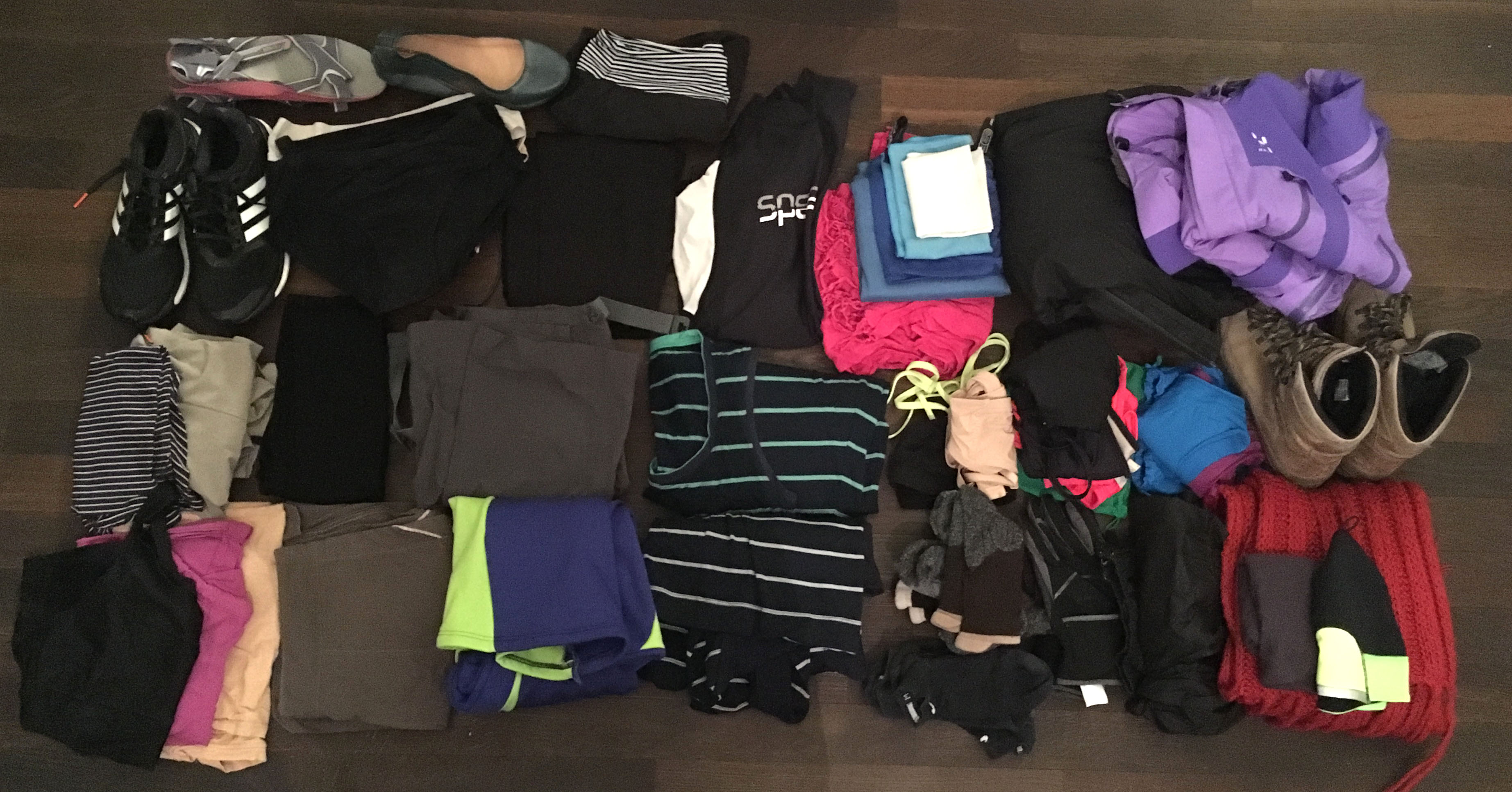
If you want any suggestions on the Philippines, I lived there for 2 years! I love and miss it dearly! 🙂
Ah that would be great! We don’t have any tips for the Philippines yet! If you have any heads up about GF food there too, that would be great. 🙂
Unfortunately I don’t have any GF tips. Not sure what your budget is…but for places to stay in Manila: Pension Natividad. It’s very chill (and cheap!) and a home away from home for Peace Corps Volunteers, so if you stay there and run into Americans…they are likely volunteers and would have excellent pointers on restaurants and things to do. Order the hot calamansi juice and pour some rum in it! 😉 During my 2 years of service as a Peace Corps Volunteer I was on the island of Bohol and I love it dearly. If you have $$$ stay at Bohol Bee Farm on Panglao Island. Gorgeous rooms and views and delicious food! Malpascqua Island which is north of Cebu is another favorite…great for thresher shark diving! I am not a diver but that’s what I’ve been told. Donsol is great for whale sharks…depending on the season. Legaspi also holds a place in my heart because that’s where my now husband then boyfriend was serving. Check out Mount Mayon and the nearby waterfalls. I didn’t spend a lot of time up North but Sagada and Ifugao are gorgeous…the rice terraces are stunning! Palawan and Coron are also great places to visit…especially for diving…lot of shipwrecks! As volunteers we were not allowed to travel down south due to the potential for being kidnapped so I have no information on it. I can answer more specific questions if you have any…other than gluten free. Most of the Filipino diet is rice based…if that helps. Do eat all of the mangoes…ahhh I miss the mangoes!
Ah thanks! Yes, I think lots of those places, especially for the diving, are on our list. I can’t wait! And nooo, definitely not venturing too far south. We will be sure to check the travel advisories before planning anything concrete!